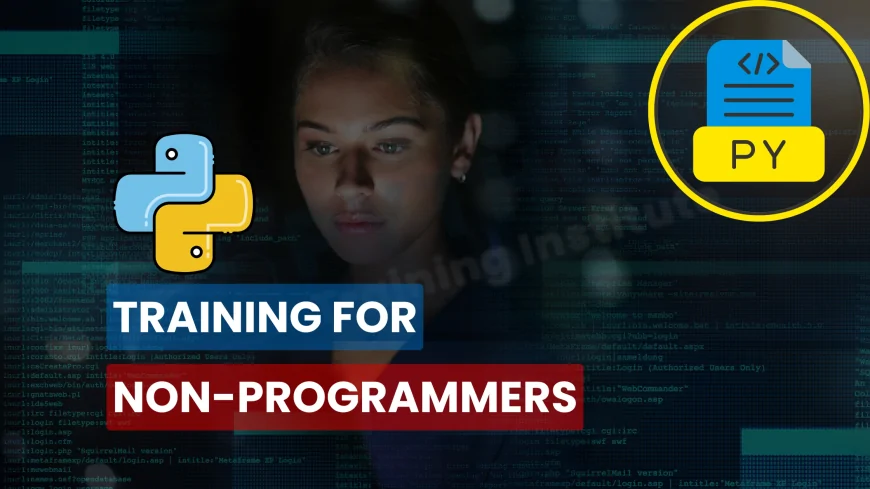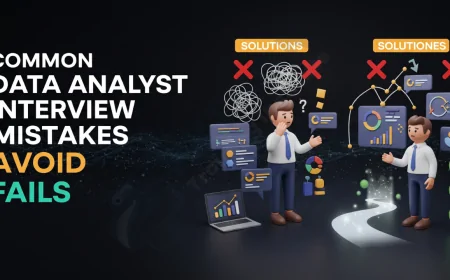Python Training Programs for Non-Programmers Pune | Beginner-Friendly Coding Courses
Discover comprehensive Python training programs in Pune specially designed for non-programmers. Learn Python from scratch with easy-to-follow lessons, hands-on projects, and expert guidance. Whether you are a student, working professional, or career changer, find the ideal course that fits your schedule and boosts your programming skills for diverse career opportunities.

Table of Contents
- Why Python Is Ideal for Non-Programmers
- Who Should Enroll in Python Training Programs for Non-Programmers?
- Features of Python Training Programs for Non-Programmers in Pune
- What Topics Are Covered in Python Training for Non-Programmers?
- Benefits of Learning Python as a Non-Programmer
- How to Choose the Right Python Training Program in Pune for Non-Programmers?
- Career Opportunities After Python Training for Non-Programmers
- Why Choose Python Training Institute in Pune?
- Conclusion
- Frequently Asked Questions (FAQs)
In today’s digital age, programming has become a vital skill across many industries. Python, known for its simplicity and versatility, is often the first choice for beginners, especially non-programmers. If you are in Pune and looking to start your coding journey without any prior experience, Python training programs designed specifically for non-programmers can be your perfect launchpad. This blog explores everything you need to know about these programs in Pune, how they cater to absolute beginners, and why Python is ideal for non-programmers.
Why Python Is Ideal for Non-Programmers
Python’s syntax is clear, readable, and closely resembles English, making it highly accessible for beginners. Unlike other programming languages with complex rules and jargon, Python lets non-programmers quickly grasp basic programming concepts, build projects, and solve real-world problems. Additionally, Python’s wide range of applications—from web development and automation to data science and AI—makes it a valuable skill across multiple fields.
Who Should Enroll in Python Training Programs for Non-Programmers?
-
Students: Those who want to start coding early with a beginner-friendly language.
-
Working Professionals: People from non-technical backgrounds aiming to upskill or switch careers.
-
Entrepreneurs and Business Owners: Individuals who want to automate tasks or understand tech aspects of their products.
-
Hobbyists and Curious Learners: Anyone interested in learning programming from scratch.
Features of Python Training Programs for Non-Programmers in Pune
1. Beginner-Friendly Curriculum
Programs start with the fundamentals — Python installation, basic syntax, data types, variables, and simple I/O operations. There is no assumption of prior coding knowledge.
2. Step-by-Step Learning Approach
Courses break down concepts into small, digestible modules with practical examples and exercises to ensure comprehension at every stage.
3. Hands-On Practice
Practical coding sessions, projects, and assignments form an integral part of the training to build confidence and competence.
4. Experienced Trainers
Instructors skilled at teaching absolute beginners provide personalized guidance and support to clarify doubts and reinforce learning.
5. Flexible Learning Modes
Both online and offline classes are offered, with weekday, weekend, and evening batches to suit diverse schedules.
6. Career and Placement Support
Many institutes offer resume building, interview preparation, and job placement assistance post-training.
What Topics Are Covered in Python Training for Non-Programmers?
-
Introduction to Python and installation setup
-
Python syntax and semantics
-
Variables and data types (strings, numbers, lists, tuples, dictionaries)
-
Control structures (if-else, loops)
-
Functions and modular programming
-
File handling basics
-
Error handling and exceptions
-
Introduction to libraries like NumPy and Pandas (optional)
-
Simple projects like calculator, to-do app, data manipulation scripts
Benefits of Learning Python as a Non-Programmer
-
Rapid Learning Curve: Easy-to-understand syntax helps beginners learn programming quickly.
-
Wide Applicability: Skills can be applied in automation, web scraping, data analysis, and more.
-
High Demand: Python is one of the most sought-after skills in the job market.
-
Foundation for Advanced Learning: Serves as a stepping stone for more complex domains like AI, ML, and software development.
-
Boosts Logical Thinking: Helps develop problem-solving skills essential for technical and non-technical fields.
How to Choose the Right Python Training Program in Pune for Non-Programmers?
-
Curriculum Focus: Look for programs designed specifically for absolute beginners.
-
Trainer Experience: Choose institutes with skilled trainers who specialize in beginner teaching.
-
Practical Exposure: Ensure the course offers plenty of hands-on coding and projects.
-
Flexible Schedule: Select courses that fit your time availability.
-
Reviews and Reputation: Check feedback from past students.
-
Certification: Verify if the institute provides certification upon completion.
-
Post-Training Support: Opt for programs that provide career guidance and placement assistance.
Career Opportunities After Python Training for Non-Programmers
Completing a Python training program opens various entry-level roles:
-
Junior Python Developer
-
Automation Tester
-
Data Analyst (with additional training)
-
Technical Support Engineer
-
Software Tester
-
Web Developer (with additional skills)
Why Choose Python Training Institute in Pune?
At Python Training Institute Pune, we offer dedicated courses for non-programmers with a structured curriculum, expert trainers, hands-on projects, and flexible timings. Our goal is to empower you with programming skills, no matter your background, so you can confidently step into the tech world or enhance your current career.
Conclusion
Python training programs tailored for non-programmers in Pune are an excellent starting point for anyone eager to learn coding without prior experience. With a beginner-friendly language like Python, expert guidance, and practical learning methods, non-programmers can master programming fundamentals and unlock new career opportunities. Whether you’re a student, professional, or hobbyist, enrolling in the right Python course can change your professional trajectory for the better.
FAQs
What is Python training for non-programmers?
Python training for non-programmers is a beginner-focused program that teaches Python coding from the basics, assuming no prior programming knowledge.
Who can join Python courses for non-programmers in Pune?
Students, working professionals, entrepreneurs, and anyone interested in learning Python without prior coding experience can join.
Are Python courses for non-programmers easy to follow?
Yes, these courses use simple language and step-by-step teaching methods to make learning easy.
What topics are covered in beginner Python training?
Topics include Python syntax, data types, control structures, functions, file handling, and basic projects.
Do Python training institutes in Pune offer flexible timings?
Most institutes offer weekday, weekend, and evening batches to accommodate different schedules.
Is hands-on practice included in these courses?
Yes, practical exercises and projects are integral to help students learn by doing.
Can I switch my career after learning Python as a non-programmer?
Yes, Python skills open opportunities in software development, automation, data analysis, and more.
How long does Python training for beginners usually take?
Courses typically range from 1 to 3 months depending on the program’s intensity.
Do I get a certification after completing Python training?
Reputed institutes provide certification that adds value to your resume.
Is Python a good language for beginners?
Yes, Python’s simple syntax and versatility make it ideal for beginners.
Can non-programmers learn Python online?
Yes, many institutes offer online training for non-programmers with live classes and recorded sessions.
What career support is available after training?
Some institutes provide resume building, interview preparation, and job placement assistance.
Are there any prerequisites for joining Python courses for beginners?
No prior programming knowledge is required; basic computer skills are enough.
What software do I need for Python training?
You just need a computer and Python installed; trainers guide you through setup.
Are Python projects included in the training?
Yes, projects help you apply what you learn and build a portfolio.
Is Python useful for automation?
Yes, Python is widely used for automating repetitive tasks.
Can I learn Python if I’m from a non-technical background?
Absolutely, Python training for non-programmers is designed specifically for that.
How to choose the best Python training institute in Pune?
Check the curriculum, trainer experience, reviews, practical exposure, and flexibility.
What jobs can I get after Python training?
Roles like junior developer, tester, data analyst, and automation specialist are common.
Is Python training expensive?
Course fees vary; many affordable options are available in Pune.
How interactive are Python classes for beginners?
Good programs have live sessions, doubt clearing, and interactive coding exercises.
Can I learn Python if I have no math background?
Yes, Python learning does not require advanced math skills initially.
How soon can I start coding after joining?
Most courses start with practical coding from day one.
Does Python training cover libraries like NumPy or Pandas?
Some beginner courses introduce basic libraries for data handling.
Can I learn Python for web development in these courses?
Basic web development concepts can be included in some programs.
Is online or classroom training better for beginners?
Both have benefits; choose based on your learning style and convenience.
Can I practice Python coding outside of classes?
Yes, practicing regularly is encouraged for mastery.
How can Python skills help in my current job?
Python can automate tasks, analyze data, and improve productivity in many roles.
Do Python courses help in preparing for advanced programming?
Yes, they provide a strong foundation for further learning.
What's Your Reaction?
 Like
0
Like
0
 Dislike
0
Dislike
0
 Love
0
Love
0
 Funny
0
Funny
0
 Angry
0
Angry
0
 Sad
0
Sad
0
 Wow
0
Wow
0
















